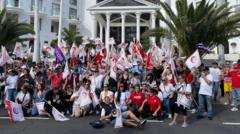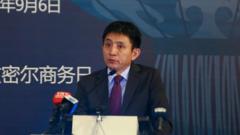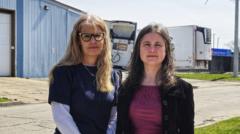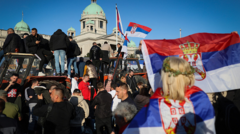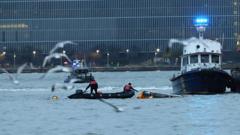As Santorini braces for its summer tourist season, continuous earthquakes threaten the island's economy. With drops in bookings and concerns over available labor, local officials and business owners are calling for government support and infrastructure improvements to protect the island's vital tourism industry.
Santorini's Summer Tourism at Risk Amid Ongoing Earthquakes
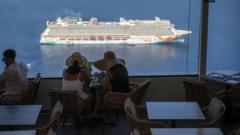
Santorini's Summer Tourism at Risk Amid Ongoing Earthquakes
The popular Greek island faces uncertainty as earthquakes impact bookings and staffing for the approaching tourist season.
As February marks the unofficial commencement of the tourist season in Santorini, Greece, the island is facing significant challenges due to a series of earthquakes that have rattled the region since January. With the arrival of the first cruise ships and the Easter holiday approaching, many are concerned about the impact of these ongoing tremors on the essential tourism sector.
Antonis Pagonis, president of the Association of Hoteliers in Greece, reported a recent decline in bookings, expressing hope that the trend is temporary. Compounding the issue is a potential shortage of seasonal workers, as the island typically relies on a fluctuating workforce from mainland Greece and abroad to meet the demands of its tourism boom.
One local worker, Manos, a returning bartender for the past five summers, has opted to seek employment elsewhere in Corfu this year due to fears that lower tourist numbers could hamper his earnings. With the summer months generally attracting tens of thousands of visitors daily, the uncertainty has prompted many workers to reconsider their options, particularly as construction work on hotels has stalled amid safety concerns.
Hotel owners are advocating for government support, including ongoing salary payments for construction workers unable to work due to the seismic activity. Pagonis indicated that while the government has been receptive to their proposals, the implementation remains uncertain.
In response to the recent earthquakes, Greek authorities have deployed rescue teams to Santorini and declared a state of emergency to expedite necessary aid. However, industry stakeholders argue that a comprehensive response must also include investments in the island's infrastructure to fortify against future challenges.
Margarita Karamolegkou, a hotel owner with four properties on the island, emphasized the urgent need for enhancements, including a new port. For Karamolegkou and others in the sector, conditions are precarious enough that if tremors persist for much longer, they may be forced to postpone the opening of their hotels.
Despite these hurdles, Karamolegkou remains optimistic and believes her business can maintain high service levels even with fewer staff. The robust tourism industry of Santorini, which contributes approximately 2.5% to Greece's GDP with an estimated annual revenue of €5.9bn, faces critical pressure if the situation does not stabilize soon.
Prime Minister Kyriakos Mitsotakis, during a recent visit to Santorini, acknowledged the significance of the island as a premier tourist destination and underscored the government's commitment to safeguarding its reputation for future tourism seasons. While the current seismic activity has led to no formal cancellations yet, ongoing drops in bookings present considerable concerns for Santorini's economic landscape in the short term.

